![]()
How to get a better night’s sleep

We all know that one effect of stress is that it can cause sleep deprivation. Frequently being in a heightened state of alertness can delay the onset of sleep and cause rapid, anxious thoughts to occur at night.
Insufficient sleep can then cause further stress, and this can in turn, impact motivation. It’s a topic most of us can relate to in some way. Even having a child that is a terrible sleeper can impact on your whole life.
We chatted to Nicole Topp, our sleep expert, for our wellness podcast series and she helped us to unpack these particular issues and how we can best address them.

Why you might struggle to fall asleep
There is a reason behind why sleep deprivation has been utilised as a method of torture! As without sleep we basically cannot function properly.
We’ve all had that wretched feeling, having been woken from a deep slumber with our eyes barely open, but our feet have already hit the ground running because we have things to do and the day must go on.
We often end up using coffee to help us wake up, because we can barely get our bodies to function and everything feels heavy. We reach straight for the stimulant, of which many of us will never give up! And that’s okay if we are aware of how addictive it can be and how it’s used as a crutch. It’s like a vicious cycle of chasing that first high.
When we are tired, we rely too heavily on coffee
“We tend to do that not only with coffee, but with refined foods and sugar too. And it may not be the first thing in the morning, but most of us will reach for some form of bread or carb goodness in the morning for convenience,” says Nicole.
“You may also find yourself chewing on the crusts of somebody else’s toast or the last dregs of cereal, or you’ve heard that zen-like sound of the cereal box being poured out all over the kitchen floor and…shove a little in your mouth, as well.”
It’s all tied into this cycle of feeling heavy, uncomfortable and just really tired. The problem is that we function all day effectively with coffee, or reach for carb loaded goodness or something sweet to pep us up. And then we have to reach for the wine in the evening to help wind down in the evening.
When you take a minute at the end of the day you may be utterly exhausted, but just can’t rest.
“It is a mindset and a really tangled one at that. I actually really like detangling that particular one because it can be so many things, and guilt is often one of them. We feel like we should always be doing more… feeling guilty is definitely one of the most common ones that I find in clinics – people won’t rest because they feel guilty,” says Nicole.

Part of this may be where we’re at in our relationships, where if one partner is out working and we’re with the kids we couldn’t possibly rest, because they’re out working. Or you may think their day has been a walk in the park compared to yours. It just depends on where everybody is at and what you’re holding onto.
How our cortisol levels impact our sleep
But when we really look at tying in how stress impacts our sleep, it’s comes down to our cortisol levels as well as the choices we make and the behaviours that we exhibit during the day.
We all have different things impacting our stress levels, but we do have a few very common themes that thread right through. Not resting when we need to and reaching for more stimulants. Or from a guilt perspective, not sleeping when your baby sleeps so you can do all the things to set up the perfect scenario.

More about cortisol
It’s important to balance things out just a little. When you’re tired or emotional, you are not going to make good food choices. You’re just looking for something to get through the afternoon slump.
So, we need to put the microscope on stress and sleep and the impact it has on our bodies. This is a big topic in itself, but Nicole focuses on cortisol just so we can understand what actually happens with our cortisol levels throughout the day and then at night – and why we feel wired when we should be fast asleep!
Lets understand cortisol a little more. Cortisol is a steroid hormone that is produced by the adrenal glands, which sit on top of each kidney. When released into the bloodstream, cortisol can act on many different parts of the body and can help:
- The body respond to stress or danger
- Increase the body’s metabolism of glucose
- Control blood pressure
- Reduce inflammation
Cortisol is a hormone that is mainly released at times of stress and needed for the fight or flight response, which is a healthy, natural response to perceived threats. The amount of cortisol produced is highly regulated by your body to ensure the balance is correct. Having the right cortisol balance is essential for human health.
As Nicole explains, “Cortisol is like that main stress hormone…Realistically, it should be pretty good in the morning, we should wake up not feeling as though we’re in a car with a flat battery. We want to wake up with a little bit of vitality.
“But if your cortisol levels are not very high, you’re totally that car with a flat battery and it is going to be a little bit more difficult to get through your day. When we are looking at cortisol, it should be relatively high in the morning and then it should go down, and have little ebbs and flows.
“And then in the evening it should be nice and low so that we can sleep really, really well. Quality and quantity.”

Stress impacts our hormones
What happens at night when we are tired yet wired, is that we end up with really high cortisol at night, which feels like the eyes snapping wide open. You could be falling asleep on the couch watching Netflix, and then the next minute you can’t seem to relax when you actually hop into bed.
Stress has such an impact on not just on sleep, but also our hormones. Your body might say you need more cortisol, it’s been a crazy day, but you can’t seem to produce enough.
“It’s really great that we will just get what we want to get through. Our bodies are incredible, they adapt, and they do all of the these things, it’s just not ideal,” says Nicole.
“It is really important to understand that it does have an impact on your hormones and that just opens up a whole other huge can of worms… When we really just need to be focusing on bringing our stress levels down.”

How do we stop this cycyle?
Treating stress is like treating just about every aspect in the body. For example, there are cortisol receptors in almost every cell in the body. So, stress is going to have a really big impact everywhere. And a lack of sleep is really going to knock out our cortisol secretion. And that’s where the issue is created.
- Try to relax later on in the day
We need to work on a decent solution for winding down, so we don’t experience that consistent short-term stress response turning into a chronic state where we are always having trouble sleeping due to stress. To really be focusing on that stress, we need to be aware of the importance of initiating some very strict actions towards being able to go to sleep at night and getting into a better pattern.
2. Be aware of how you are stimulating your body throughout the day
Acknowledging and being aware when our stress levels are getting a little higher and this can be anything that increases the metabolic rate. Everything that we are doing during the day is going to impact how we are going to rest and recover at night.
3. Do things, like journaling, to help you wind down properly
Often, we don’t process the day until late in the evening, as we’re constantly on the go. Then we start to process at a time when we should be resting and sleeping. Something as simple as journaling can help get everything out that’s in the body and mind, so that we can get it moving. Or you may be more of a talker but it’s finding ways of dumping your thoughts at the right time.
4. Nicole’s tips on how to get a better night’s sleep that we may not want to hear!
“The first thing that I’d definitely look at doing, is noticing where we are just numbing out at night. Let’s just be really, really aware of why you might reach for a glass of wine,” she says.
“Excellent sleep is really, really important. And drinking during the week or regularly is not going to improve your sleep. The way that I assist people with their sleeping, is to make sure that they’re doing things before they go to bed that are going to be useful for the quality and quantity of their sleep. And wine will help you get to sleep. But as we know, it won’t help you maintain excellent quality.”
Turn your phone and devices off

Notice when you’re numbing out with Netflix, scrolling on social media or online shopping. We can so quickly lose half an hour, an hour.
This isn’t a useful practice when you are in the peak of having trouble sleeping due to stress. You can go back to watching TV when you are in the right frame of mind, but during times of sleep and stress you should ask yourself, What else could I be doing? The answer could be to have a nice hot shower, or bath, read a book or go to bed early and practice some meditation or breathing.
Have a nighttime routine
There are so many other options available to us, we need to be aware of our evening ritual and how this best prepares us for sleep. Not just being slumped over the kitchen sink doing dishes and then falling into bed.
As much as you can, when it’s available to you, your routine after lunch should focus on being in a calmer state of mind. This includes limiting your stimulants after lunch. Even caffeine levels from tea can be a factor.
“I am a realist and I realise that is not always the way that it’s going to go, but getting a little bit of preparation done and having those hard conversations earlier in the day. That way you’re not stuck at 9 o’clock at night having to chat with hubby about the goodness knows what, that doesn’t work very well. No one sleeps well after that,” adds Nicole.
So, here’s to excellent sleeps all round. Pour a hot bath, read a book and switch off from mum-life for those crucial hours leading up to sleep. If we fall over, we all know the domino effect that can cause, so make sure you take that time as it can make all the difference.


